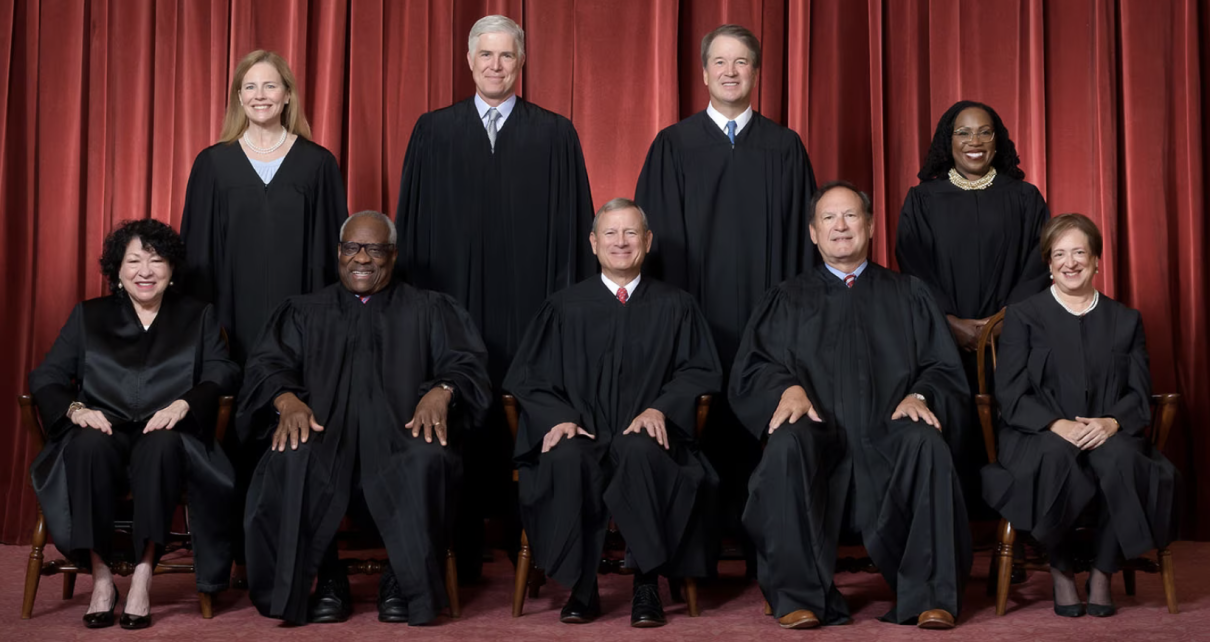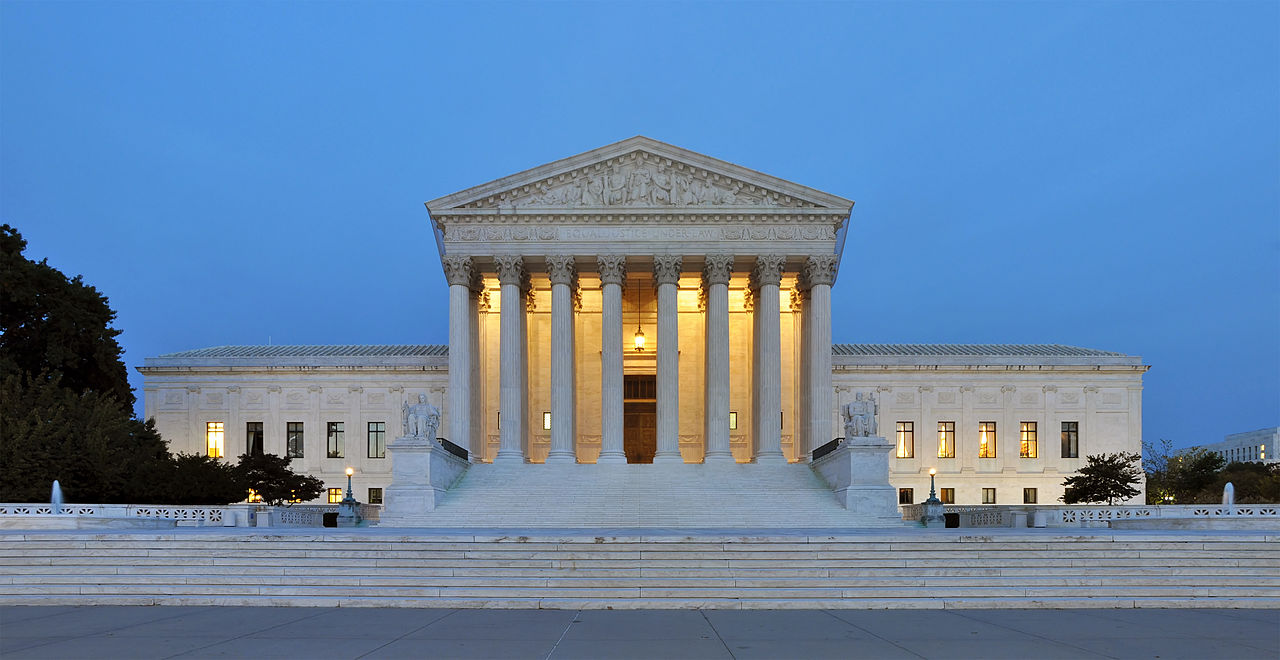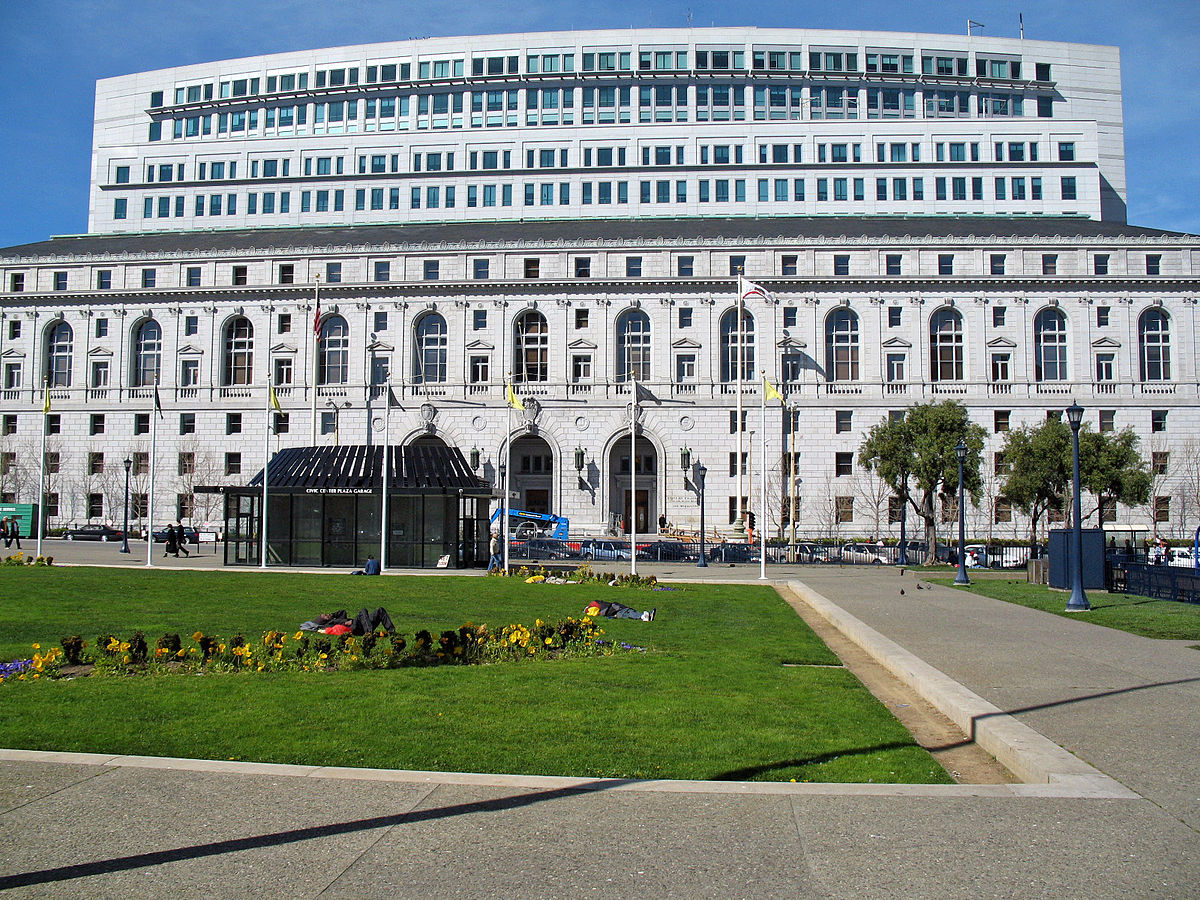
Justices of The U.S. Supreme Court. (Photo: supreme court.gov)
U.S. Supreme Court Decision Allows Cities to Ban Homeless Camps
Several Californian cities cleared to continue on with bans legally
By Evan Symon, June 28, 2024 4:50 pm
In a 6-3 decision on Friday, the U.S. Supreme Court ruled that local government ordinances with civil and criminal penalties for camping on public land does not violate the eighth amendment protections from cruel and unusual punishments, clearing the way for cities to more easily ban homeless encampments and more easily introduce punishments against those in encampments.
For several years, many Western cities, including many in California have attempted to introduce camping bans in public areas to help curtail homeless populations, as well as keep health, crime, and safety in check because of the issues that such encampments bring. While the namesake of the Supreme Court case, City of Grants Pass v. Johnson, refers to city of around 39,000 in Oregon about an hour north of the California border, many of the ordinances have been attempted, or are currently in place, in California.
In 2021, the Los Angeles City Council put such a ban into effect. The ordinance bans lying, sitting, sleeping, and storing personal property on public land that blocks sidewalks, streets, and bike lanes, driveways, freeway overpasses, and on-ramps. Homeless encampments are also not be allowed within 500 feet of a “sensitive facility” such daycare centers, driveways, fire hydrants, homeless shelters, libraries, schools, libraries, and parks. Since being passed, homeless advocates have rallied against it, causing the L.A. City Council to review it several times for effectiveness.
The other big city in California to institute such a ban, San Diego, went into effect last year. According to the ordinance, camping will be banned on public property, including sidewalks and city parks. While the ban is total, for it to be enforceable, the city has to provide shelter space for the homeless. The only exception that can avoid the shelter space caveat would be any encampment within a two-block radius of homeless shelters, schools or public parks, of which the ban would be total. Like L.A., San Diego has faced challenges as well from homeless advocates.
At the state level, statewide bans on homeless people on public property, such as near schools and transit stops, have been attempted. However, the California legislature has killed those bill for several years, with many Democratic lawmakers putting ahead not wanting to add penalties against homeless people over health and safety concerns. The most recent such bill, SB 1011, was killed in the Senate Public Safety Committee this April by a 1-3 vote.
Despite those setbacks, all eyes have been on the Grants Pass case this year. While advocates hoped that the court would rule in favor of Johnson like lower courts to set up such encampment bans on public property as “cruel and unusual punishment,” supporters of Grants Pass, including most city leaders in the state, wanted the court to side with the city. If ruled that way, supporters said that not only would the current city bans in California be solidified, but that other cities could more easily pass such laws.
This led to the court to rule 6-3 on Friday in favor of the city ordinances. Justice Neil Gorsuch, writing for the majority opinion, said, “Homelessness is complex. Its causes are many. So may be the public policy responses required to address it. A handful of federal judges cannot begin to ‘match’ the collective wisdom the American people possess in deciding ‘how best to handle’ a pressing social question like homelessness.”
“People who have no choice but to sleep outdoors could raise that as a necessity defense, if they are ticketed or otherwise punished for violating a camping ban.”
The 6-3 Grants Pass ruling
Only the three most liberal three justices dissented: Sonia Sotomayor, Elena Kagan, and Ketanji Brown Jackson.
“Sleep is a biological necessity, not a crime,” said Sotomayor in the dissenting opinion. “Homelessness is a reality for so many Americans. Punishing people for something they can’t control, like homelessness, is cruel and unusual. Striking down Eighth Amendment arguments against camping bans likely won’t end the fights over the ordinances in court.”
In California, the ruling has had a mixed response. Some city lawmakers came out against it, citing concerns that some cities will only see an influx of homeless people as a result. This includes Los Angeles Mayor Karen Bass:
“If it’s OK for other cities to ticket and shoo people away, I will be very concerned that the number of people moving into L.A. from other cities will increase,” said Bass Friday morning during a press conference. “I also do not believe that it is ultimately a solution to homelessness. How are they supposed to pay for their ticket, and what happens when they don’t pay? Does it go into a warrant and give us an excuse to incarcerate somebody?”
However, other lawmakers lauded the decision. Senator Brian Jones (R-San Diego), whose SB 1011 bill was killed off earlier this year, saw the ruling as something of a vindication of his recent efforts:
“Today’s decision rightly empowers state and local officials to compassionately clear encampments,” said Jones. “Californians should not have to tolerate the encampments that have taken over our communities. This is not about criminalizing homelessness—it’s about ensuring the safety of both the community and homeless individuals. With this decision, Democrat politicians can no longer justify allowing this severe public health and safety crisis to persist on our streets. It’s time to clean up California.
“The ruling also reaffirms that my bipartisan Senate Bill 1011 from this year is a compassionate and legal approach to addressing homeless encampments. I am committed to continuing to work on this measure to ensure the safety of the community and the dignity of homeless individuals.”
Surprisingly, Governor Gavin Newsom also came out in favor of the ruling, saying in a statement Friday:
“Today’s ruling by the U.S. Supreme Court provides state and local officials the definitive authority to implement and enforce policies to clear unsafe encampments from our streets. This decision removes the legal ambiguities that have tied the hands of local officials for years and limited their ability to deliver on common-sense measures to protect the safety and well-being of our communities.”
Today’s Supreme Court ruling in Grants Pass provides state and local officials the definitive authority to implement and enforce policies to clear unsafe homeless encampments and helps us deliver common-sense measures to protect the safety and well-being of our communities. pic.twitter.com/dNwMf6zhIG
— California Governor (@CAgovernor) June 28, 2024
Others were more indifferent on the ruling, instead touting how other local homeless plans would not be disrupted by the new ruling. San Diego Mayor Todd Gloria, who has defended the San Diego ban, said:
“This ruling brings much-needed clarity to how the city can enforce our laws against unsafe encampments; however, it will not change our strategy on homelessness. It is clear that the 1,000 new shelter opportunities we’ve added in the past three years is working to reduce street homelessness, and we intend to continue to pursue additional beds like those planned for Kettner and Vine to help people off the street and get them connected to care and resources.”
Overall, however, city leaders tended to agree with the ruling, as it gives local cities more power in deciding how to tackle homeless issues in their respective cities, from large cities like Los Angeles down to small towns.
“Homeless advocates have a lot more tricks up their sleeves in trying to stop these ordinances from going into place,” said Francesca Russo, a researcher on homeless ordinance cases, to the Globe on Friday. “But the Grants Pass ruling is huge. It allows for anti-camping ordinances once and for all, and perhaps more critically, that the U.S. Supreme Court will weigh down this way into at least the near future. Cities in California, Oregon and other Western cities who have tried and tried again for these ordinances, can finally bring them up. For many, cites can start to go back to being cities again.”
More reactions to the Grants Pass case are likely to come later on Friday and into the weekend.
- Bill to Require Law Enforcement Disclosure if AI Was Used To Help Write Reports - August 7, 2025
- Gov. Newsom Files FOIA Request To ‘Expose True Cost’ Of L.A. Federal Troop Deployment for Anti-ICE Riots - August 6, 2025
- California Redistricting: How Newsom’s Plan Will Demolish Hard Fought GOP Gains - August 6, 2025




2 thoughts on “U.S. Supreme Court Decision Allows Cities to Ban Homeless Camps”